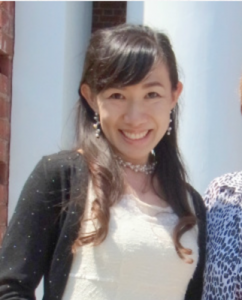How would you briefly describe your current research/job to someone who is not familiar with your field of study/work? What is your main research interest?
My main research interest is in conducting cross-cultural research and developing nutrition education programs that may be used in diverse settings. My dissertation identified parental influences on eating behavior of early adolescents in Hawaiʻi while primary caregivers are not present among both low-income and middle- to high-income families. In addition, we examined the validity of the comprehensive feeding practices questionnaire with parents of children and adolescents in Hawaiʻi, described their feeding practices, and examined differences in practices according to demographic characteristics.
How would you briefly describe your current research/job to someone who is not familiar with your field of study/work? What is your main research interest?
My main research interest is in conducting cross-cultural research and developing nutrition education programs that may be used in diverse settings. My dissertation identified parental influences on eating behavior of early adolescents in Hawaiʻi while primary caregivers are not present among both low-income and middle- to high-income families. In addition, we examined the validity of the comprehensive feeding practices questionnaire with parents of children and adolescents in Hawaiʻi, described their feeding practices, and examined differences in practices according to demographic characteristics.
What are the main barriers you encounter/experience when conducting research, or what information/skills do you lack to conduct high quality research?
Having a gap in social identities between study participants and researchers may influence rapport-building when conducting research. For example, I was given the irreplaceable opportunity to work with indigenous populations throughout several research projects during my Ph.D. program. At the beginning of the research, I had a hard time being accepted by the Native Hawaiian and Pacific Islanders community. I learned about their history, culture, as well as the disadvantaged socioeconomic backgrounds and health disparities. I was mindful of respecting their beliefs, values, and cultural safety, and faced each individual with affection as if they were my own family. Then, we gradually could move forward in our relationship and build rapport. I believe that consistently considering social identities including cultural practices and acknowledging them will expand our perspectives and cultivate the skills to see things multidimensionally, which may be the key to building rapport as well as conducting high-quality research.
What could help you as a student/ECR to further develop/grow in your current position?
Connecting with people—not only in the same institution but also students and researchers who have the same interests at other institutions from various countries and cultures. These connections broaden viewpoints and may lead to collaborative work, amplifying future research for diverse populations.
Moreover, I must never forget the feeling of gratitude and to express it— to advisors, mentors, project team members, administrators, study participants, friends and family. Without everyone’s support, I would not have been able to get to this point in my academic journey and acknowledging their support always helps me overcome any challenges.
What do you think will be the next most important development in the nutrition and/or physical activity field?
Nowadays, anyone can easily spread information through online platforms regardless of its accuracy; however, following practices that are not evidence-based could induce undesirable lifestyle behaviors. Therefore, establishing a system of sharing accurate and up-to-date information, which is easily accessible, understandable, and pleasurable, with members of the community is vital to health enhancement without the risk of being manipulated by unreliable information.
If you’d like to get in touch with Asuka, you can do so via email [email protected]


